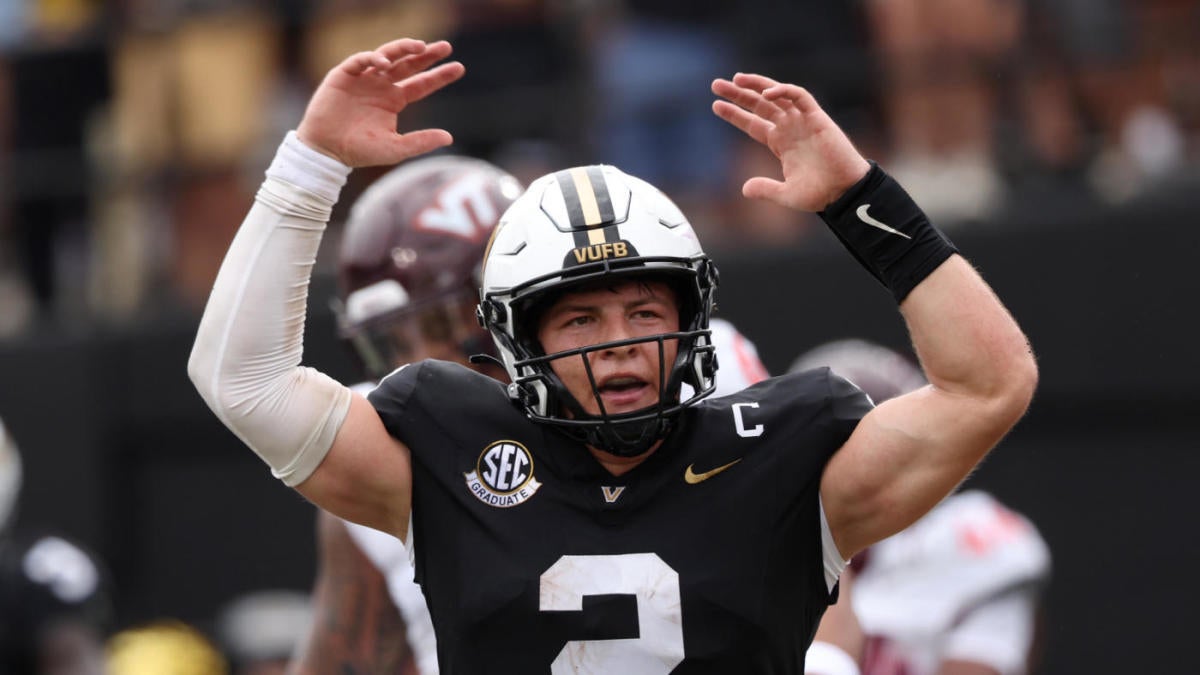The stakes of being a junior college transfer may have changed after Vanderbilt quarterback Diego Pavia was granted injunctive relief in his case against the NCAA. The case isn’t over, but the initial ruling in favor of Pavia means his year at New Mexico Military institute (a junior college) does not count against his NCAA eligibility clock.
For now, he plans to take advantage of the newfound year at Vanderbilt, according to his attorney, provided that he and the ‘Dores can come to an agreement on a compensation package. Pavia’s case effectively sought to put junior college enrollment on the same footing as prep schools, which the three service academies use to stash future players at. Pavia and his team argued that because JUCOs are outside of the NCAA’s jurisdiction, his eligibility clock shouldn’t have started until he got to New Mexico State in 2022, and that he is being barred from earning money he’d otherwise be able to earn playing college football.
The ruling isn’t a class-action and is specific to Pavia. For other players in his position, does the opportunity exist to follow his lead? According to Mit Winter, a sports law attorney based in Kansas City, there is.
“Technically the order only applies to Pavia, but in my opinion there’s no way the NCAA is going to enforce the rule that was enjoined in that order against anyone,” Winter told CBS Sports. “If you think about it, any other athlete in Pavia’s situation can now go to a court, file the same exact type of lawsuit and say here’s an order from another court specifically saying this likely violates antitrust law and you enjoined it.
“If the NCAA tries to enforce this rule against other athletes, there’s gonna be a tsunami of lawsuits in my opinion.”
It may not even take specific legal action if a specific school’s compliance department is willing to effectively dare the NCAA to make a move, according to Winter, who thinks schools would act boldly based on the Pavia ruling if events warrant.
The NCAA’s only statement so far on the case is their usual party line displeasure when facing a legal setback.
“The NCAA is disappointed in today’s ruling and wants all student-athletes to maximize their name, image and likeness potential without depriving future student-athletes of opportunities. Altering the enforcement of rules overwhelmingly supported by NCAA member schools makes a shifting environment even more unsettled. The NCAA is making changes to deliver more benefits to student-athletes, but a patchwork of state laws and court opinions make clear that partnering with Congress is essential to provide stability for the future of all college athletes.”
At least one high-profile head coach, Texas’ Steve Sarkisian, agrees. Sarkisian played two seasons at JUCO before enrolling at BYU. His response Thursday when asked by reporters on a zoom interview for his response to the Pavia injunction was blistering.
“We chose to go to junior college football, and that’s where we wanted to start and play our career. I don’t understand it at all. We’ll have guys 28 and 29 years old playing college football. What’s the point, man? I don’t get it, I don’t understand it, I totally disagree with it.”
An unspoken door being open due to the NCAA being unwilling to participate in further court challenges is essentially what happened with recent high-profile eligibility cases in Tennessee and West Virginia.
In West Virginia, a court allowed for athletes who transferred a second time to play immediately.
In Tennessee, a federal court permitted boosters and collectives to negotiate with athletes before the enrolled at a school.
Both are now common practice in college sports. In this way, the NCAA is again effectively barred from enforcing a rule on its books, rendering the organization feckless.
Just because Pavia has been granted this injunction does not mean he has won the case. The court found that because the transfer portal closes on Dec. 28, it was necessary to allow Pavia to enter it or choose to stay at Vanderbilt while the final ruling is still to be decided, which will likely happen at some point in 2025.
Even if he happens to lose this case during the 2025 season, he’d only be immediately ineligible, and it wouldn’t be retroactive or punitive to Vanderbilt; games he played could still stand because he wouldn’t be ineligible at the time they’re played.
Pavia put together a sensational season in 2024, his first at the power conference level. The Albuquerque, New Mexico native threw for 2,133 yards, rushed for 716 and scored 23 total touchdowns to lead Vanderbilt to its first bowl game since 2018. He led the Commodores to a shocking upset of then-No. 1 Alabama, the program’s first win over the Tide since 1984.

